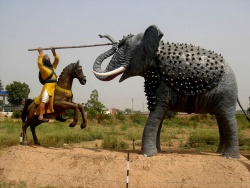Bhai Bachittar Singh: Difference between revisions
Hari singh (talk | contribs) No edit summary |
Khalsaraaj (talk | contribs) mNo edit summary |
||
| (16 intermediate revisions by 6 users not shown) | |||
| Line 1: | Line 1: | ||
{{fa|291}} | |||
{{p|File:Bhai Bachittar Singh.jpg|Bhai Bachittar Singh attacks the drugged elephant}} | |||
'''Bhai Bachittar Singh''' (d. 1705), warrior and martyr, was the second son of [[Bhai Mani Singh Shaheed]], a Parmar Rajput and devotee of the [[Gurus]]. One of the five brothers presented by their father for service to [[Guru Gobind Singh]], he joined the order of the [[Khalsa]] on the historic [[Baisakhi day]], [[14 April]] [[1699]], and shot into prominence during the first [[battle of Anandpur]] against the hill chieftains, when, on [[1 September]] [[1700]], he was selected by [[Guru Gobind Singh]] to single-handedly face a drunken elephant brought forth by the enemy to batter down the gate of [[Lohgarh Fort]]. | |||
As the elephant approached the gate, Bachittar Singh, (as narrated in the ''Gurbilas Patshahi 10'') sallied forth on horseback and made a powerful thrust with his spear piercing the elephant's armour plate and injuring the animal in the forehead. The wounded elephant ran back creating havoc and great damage in the enemy's ranks. As a result of Bhai sahib's bold action, the Sikhs gained an upper hand in this conflict. | |||
Bachittar Singh also took part in actions at Nirmohgarh and Basali and in the last battle of Anandpur. On the fateful night of 5-6 December 1705, when Anandpur was evacuated, he was one of those who safely crossed the torrential Sarsa rivulet. At the head of a flanking guard watching pursuers from the direction of [[Ropar]], he had an encounter with a body of irregulars near Malikpur Ranghran in which he was seriously wounded. He was carried , near death, to Nihang Khan's house at [[Kotla Nihang Khan]] by [[Sahibzada Ajit Singh]] and [[Bhai Madan Singh]]. | |||
Guru Gobind Singh asked Nihang Khan to look after Bachittar Singh, after which he proceeded with the remaining forty or so Sikhs towards [[Battle of Chamkaur Sahib|Chamkaur]]. Guru Gobind Singh, before his departure, bestowed upon Nihang Khan; a sword, a dagger and a shield. | |||
Rumors spread as quickly in those days as they do today, so hearing that Nihang Khan was sheltering some Sikhs, the Mughal troops searched his house while the mortally wounded Bachittar Singh lay in a small room attended by Nihang Khan's daughter. Living up to his name, Nihang Khan maintained his cool and succeeded in keeping the search party from entering the room by telling them that his daughter was nursing her very sick husband. Thus the danger was averted, but the life of Bachchittar Singh could not be saved. He succumbed to his injuries and breathed his last on 8 December 1705. | |||
Nihang Khan had the cremation performed secretly the following night. | |||
==External links== | |||
* [http://www.bachittar.com/ Bhai Bachittar Singh] | |||
==References== | ==References== | ||
1. Shamsher, Gurbakhsh Singh, Shahidi Jivan. Nankana Sahib, 1938 | *1. Shamsher, Gurbakhsh Singh, Shahidi Jivan. Nankana Sahib, 1938 | ||
[[Category:Great Sikh Warriors]] | [[Category:Great Sikh Warriors]] | ||
[[category:Martyr]] | [[category:Martyr]] | ||
[[Category:Bhai]] | [[Category:Bhai]] | ||
Latest revision as of 12:11, 17 January 2021
Bhai Bachittar Singh (d. 1705), warrior and martyr, was the second son of Bhai Mani Singh Shaheed, a Parmar Rajput and devotee of the Gurus. One of the five brothers presented by their father for service to Guru Gobind Singh, he joined the order of the Khalsa on the historic Baisakhi day, 14 April 1699, and shot into prominence during the first battle of Anandpur against the hill chieftains, when, on 1 September 1700, he was selected by Guru Gobind Singh to single-handedly face a drunken elephant brought forth by the enemy to batter down the gate of Lohgarh Fort.
As the elephant approached the gate, Bachittar Singh, (as narrated in the Gurbilas Patshahi 10) sallied forth on horseback and made a powerful thrust with his spear piercing the elephant's armour plate and injuring the animal in the forehead. The wounded elephant ran back creating havoc and great damage in the enemy's ranks. As a result of Bhai sahib's bold action, the Sikhs gained an upper hand in this conflict.
Bachittar Singh also took part in actions at Nirmohgarh and Basali and in the last battle of Anandpur. On the fateful night of 5-6 December 1705, when Anandpur was evacuated, he was one of those who safely crossed the torrential Sarsa rivulet. At the head of a flanking guard watching pursuers from the direction of Ropar, he had an encounter with a body of irregulars near Malikpur Ranghran in which he was seriously wounded. He was carried , near death, to Nihang Khan's house at Kotla Nihang Khan by Sahibzada Ajit Singh and Bhai Madan Singh.
Guru Gobind Singh asked Nihang Khan to look after Bachittar Singh, after which he proceeded with the remaining forty or so Sikhs towards Chamkaur. Guru Gobind Singh, before his departure, bestowed upon Nihang Khan; a sword, a dagger and a shield.
Rumors spread as quickly in those days as they do today, so hearing that Nihang Khan was sheltering some Sikhs, the Mughal troops searched his house while the mortally wounded Bachittar Singh lay in a small room attended by Nihang Khan's daughter. Living up to his name, Nihang Khan maintained his cool and succeeded in keeping the search party from entering the room by telling them that his daughter was nursing her very sick husband. Thus the danger was averted, but the life of Bachchittar Singh could not be saved. He succumbed to his injuries and breathed his last on 8 December 1705.
Nihang Khan had the cremation performed secretly the following night.
External links
References
- 1. Shamsher, Gurbakhsh Singh, Shahidi Jivan. Nankana Sahib, 1938

